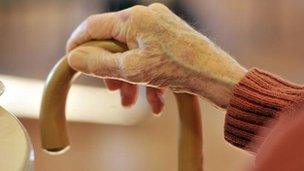Growth of what?
- Published

Did Jessica win for all of us?
A quarter of growth at 1% could be a cause for national rejoicing, like an unexpected gold medal in the economic Olympics.
It was beyond the higher end of most expectations. And if sustained for a year, the UK would be heading towards the growth rates of emerging economies, as their heady expansion heads south.
But the commentary, in the hours since the Office of National Statistics (ONS) released its first estimate of the UK's economic performance for the third quarter of 2012, has been hedged about by leylandii-sized caveats.
One of them is that the Q3 figure is so strong that it will lead to a downward rebound in Q4. The words 'triple dip' are now being bandied around.
There is also the interpretation that the London Olympics skewed the figures, along with an extra public holiday. (I seem to remember last year's extra public holiday was thought to have depressed output.)
And it's not just away from London that people are wondering how evenly this growth is spread. Unite the Union is pointing to the metrocentric economy, where the Olympics boosted spending.
Beyond London, the signs are of restaurants, bars and hotels struggling, as people stayed at home to watch sport or as foreigners kept away from Olymptastic Britain. Likewise, time spent watching sport was time not spent shopping online.
The ONS offered a comparison with Australia at the time of the Sydney Olympics, where it seemed to suffer a downward blip while the economy was skewed towards the sport. At least this first indication is that Britain's blip was a positive one.
Doom-merchants
The best hope for the 1% growth figure is that enough people ignore the doom-merchants and get a lift of confidence, remembering that economies do have a strong habit of returning to growth, eventually.
That confidence could be helped by last week's UK data showing inflation, jobs and retail heading in a helpful direction.
Not so in Scotland, where jobs and retail were last week bucking the UK trend - if trend is what it is.
And Scotland won't find out if it's going to follow the trend of the UK GDP figures for nearly three more months. The most recent figures, out last week, were for 0.4% contraction in the second quarter of the year, in line with the UK figure. Matching 1% in Q3, with the Olympics far off, is a big ask.
Economic wellbeing
But apart from being a fillip to confidence, how helpful are the GDP figures to explaining how we feel about the state of the economy?
The ONS produced a couple of interesting reports earlier this week that shed some light on that.
One was an assessment of another measure; net national income. That is a measure of the total income available to the citizens of the UK, allowing for flows of income in and out of the country. It can be used to take into account the effect of inflation in eroding earnings, as well as tax and benefit changes.
It's striking how different that looks from GDP as a measure of economic well-being. Since the 2007 peak before the financial crash and recession, UK GDP fell 4.1% by the second quarter of this year.
But net national income fell by 10.4%. And measured per head, with a rising population, the fall in net national income has been 13.2%.
While GDP per head has fallen 7%, that net national income per head figure is probably a more realistic measure of how we feel about our household finances.
Grey pound
And if you're retired? The ONS produced another report into the level of income of retired households', comparing 1977 with last year.

Retired people have never had it so good
The results show retired people are significantly better off than they were, in real and relative terms.
In comparable terms, average disposable income grew for retired households by two and a half times over that period, to £17,700 last year, and it's grown more steadily than for non-retired households.
The gap between workers and retired people remains quite wide, with average disposable income for non-retired households reaching £35,000, but the gearing is much less than it was.
Whereas the bottom fifth of the population used to be largely made up of retirees, there is a much more even spread across the income range.
Why? Largely because occupational pensions kicked in. In 1977, they accounted for 18% of income. By last year, it had risen to 40%.
While retirees were more likely to have investment income, that hasn't grown by much. There was also the impact of pensioner credits to boost the state pension.
What the ONS does not say is what happens to retirees' income over the next 34 years. I have a vested interest, and more sense of gloom.
While it may not feel like it to many of them, we may come to see today's retirees as living through something of a golden age.
You can comment or follow Douglas Fraser on Twitter: @BBCDouglsFraser